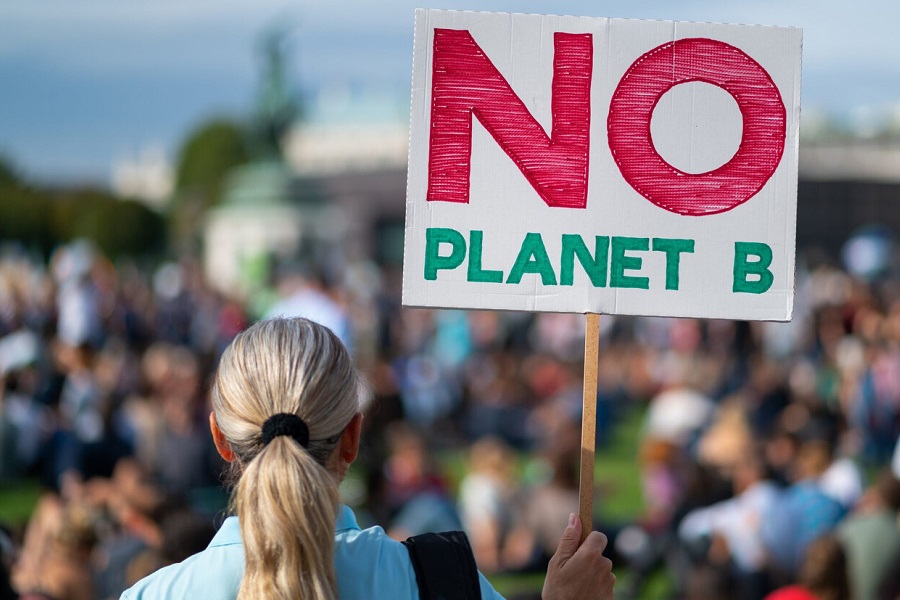11 Dec 2024

Tired Earth
By The Editorial Board

According to a new paper in Oxford Open Climate Change, the strategies humanity must pursue to reduce climate change will have to include more than reducing greenhouse gases. This comes from an analysis of climate data led by researcher James Hansen.
Scientists have known since the 1800s that infrared-absorbing (greenhouse) gases warm Earth's surface, and that the abundance of greenhouse gases changes naturally as well as from human actions. Roger Revelle, who was one of the early scientists to study global warming, wrote in 1965 that industrialization meant that human beings were conducting a "vast geophysical experiment" by burning fossil fuels, which adds carbon dioxide (CO2) to the air. CO2 has now reached levels that have not existed for millions of years.
Climate sensitivity
A long-standing issue concerns how much global temperature will rise for a specified CO2 increase. A 1979 study released by the United States National Academy of Sciences concluded that doubling atmospheric CO2 with ice sheets fixed would likely cause global warming between 1.5 and 4.5° Celsius. This was a large range, and there was additional uncertainty about the delay in warming caused by Earth's massive ocean.
This new paper reevaluates climate sensitivity based on improved paleoclimate data, finding that climate is more sensitive than usually assumed. Their best estimate for doubled CO2 is global warming of 4.8°C, significantly larger than the 3°C best estimate of the United Nations Intergovernmental Panel on Climate Change.
Aerosols
The authors also conclude that much of the expected greenhouse gas warming in the past century has been offset by the cooling effect of human-made aerosols—fine airborne particles. Aerosols have declined in amount since 2010 as a result of reduced air pollution in China and global restrictions on aerosol emissions from ships. This aerosol reduction is good for human health, as particulate air pollution kills several million people per year and adversely affects the health of many more people.
However, aerosol reduction is now beginning to unmask greenhouse gas warming that had been hidden by aerosol cooling. The authors have long termed the aerosol cooling a "Faustian bargain" because, as humanity eventually reduces air pollution, payment in the form of increased warming comes due.
This new paper predicts that a post-2010 acceleration of global warming will soon be apparent above the level of natural climate variability. The 1970-2010 global warming rate of 0.18°C per decade is predicted to increase to at least 0.27°C per decade during the few decades after 2010. As a result, the 1.5°C global warming level will be passed this decade and the 2°C level will be passed within the following two decades.
Policy
In a final section, Hansen describes his perspective based on decades of experience in trying to affect government policies. First, he believes that achievement of rapid phasedown of CO2 emissions requires a rising domestic carbon fee with a border duty on products from nations without a carbon fee, as well as support of modern nuclear power to complement renewable energies.
Second, he argues that the West, which is primarily responsible for climate change, must cooperate with developing nations to help them achieve energy paths consistent with a propitious climate for all.
Third, even with these efforts, Hansen believes that global warming will reach levels with dangerous consequences; he argues that we should also carry out research and development for temporary, purposeful, actions to address Earth's now enormous energy imbalance.
A decade ago, Hansen noted that Earth was out of energy balance by 0.6 W/m2 (watts per square meter). There was that much more energy coming in (absorbed sunlight) than going out (heat radiation to space). That excess—which is the proximate cause of global warming—is equivalent to 400,000 Hiroshima atomic bombs per day, with most of that energy going into the ocean. Now, largely because of decreasing aerosols, the imbalance has doubled to about 1.2 W/m2.
This huge imbalance is the proximate cause of accelerated global warming and increased melting of polar ice, which is likely to shut down overturning ocean circulations and cause large, rapidly rising, sea level later this century.
The paper argues that such action will be essential to avoid the greater geotransformation that will occur in the absence of such action. Potential actions include injection of stratospheric aerosols, for which volcanoes provide relevant but inadequate test cases, and spraying of salty ocean water by autonomous sail boats in regions susceptible to cloud seeding.
Hansen suggests that young people focus on an underlying problem that has developed in western democracies, especially the United States: "The ideal of one person/one vote has been replaced by one dollar/one vote," Hansen argued. "Special financial interests—the fossil fuel industry, the chemical industry, the lumber industry, the food industry, for example—are allowed to buy politicians. It is no wonder that climate is running out of control, environmental toxicity is in the process of exterminating insects including pollinators, forests are mismanaged, and agriculture is designed for profit, not for nutrition and the public's well-being."
"We live on a planet with a climate characterized by delayed response, which is a recipe for intergenerational injustice," Hansen continued. "Young people need to understand this situation and the actions needed to assure a bright future for themselves and their children."
Source : phys.org
Comment